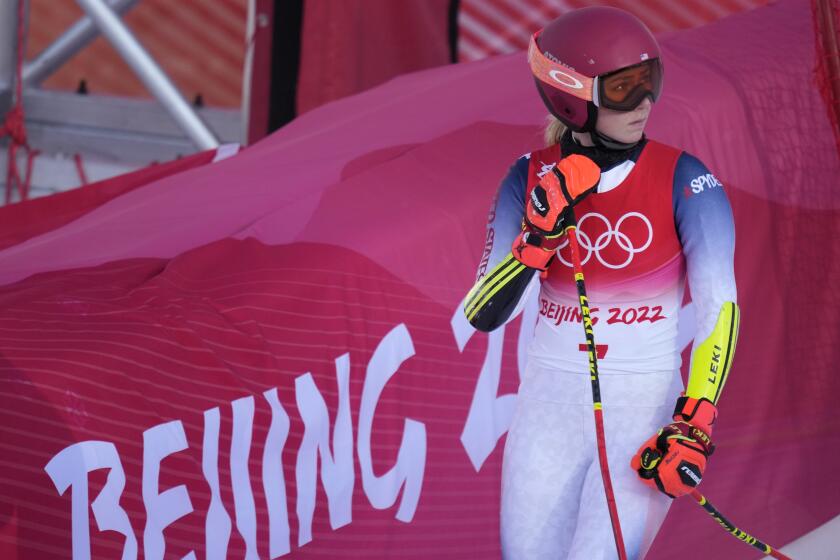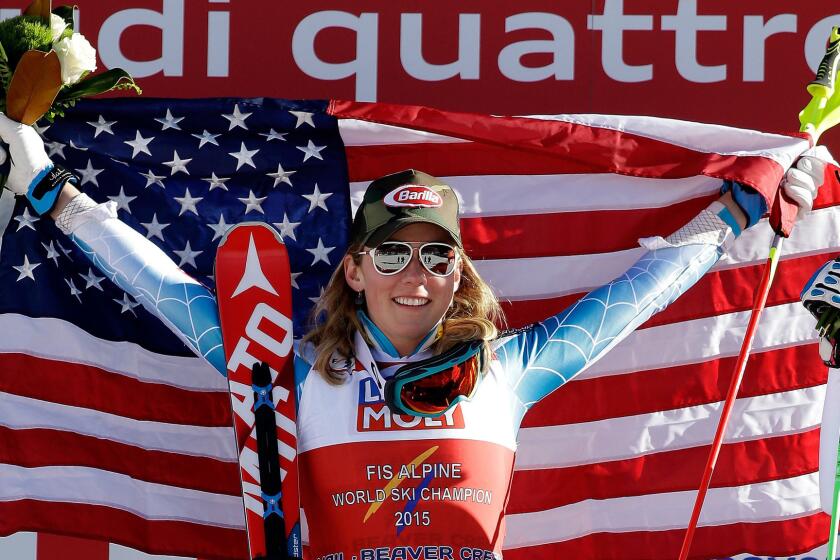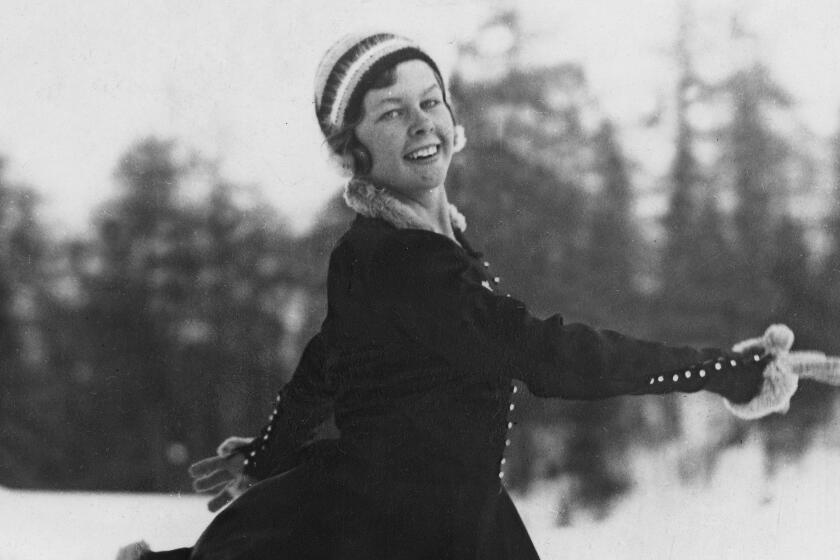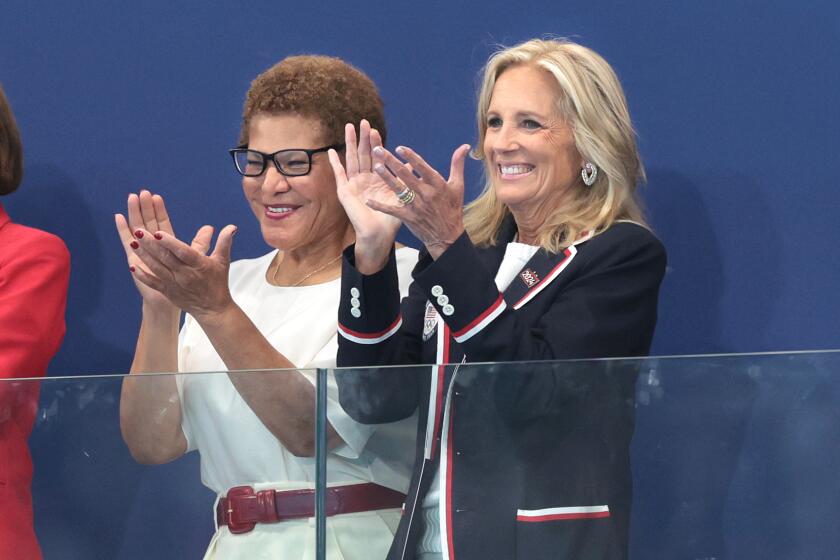Mikaela Shiffrin fails to finish second straight race at Olympics
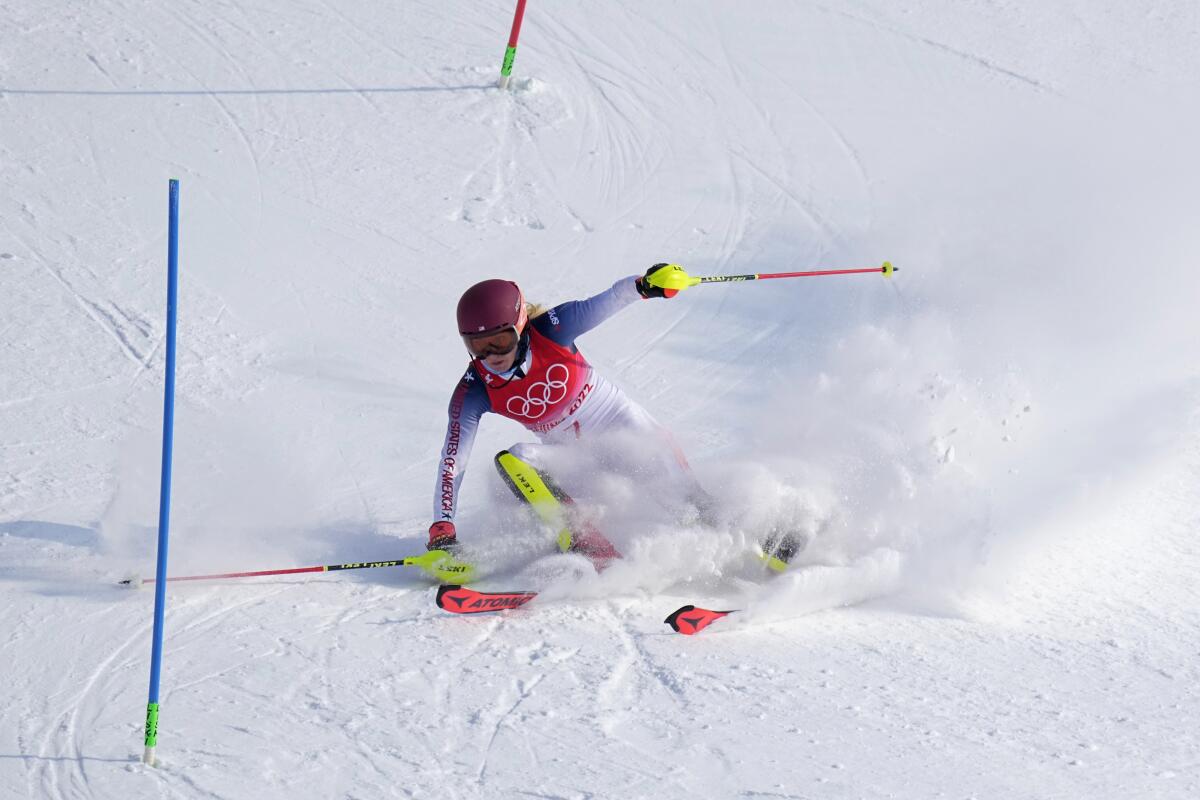
BEIJING — On a lonely stretch of snow next to orange safety netting that lines the Yanqing National Alpine Skiing Centre, Mikaela Shiffrin searched for the answer.
The world’s best female skier sat on the side of the steep course known as the Ice River, head buried in her arms, skis and poles discarded nearby, and wondered how the Winter Olympics had gone so wrong.
She had been cast as one of the faces of the Games, featured in television commercials and on magazine covers, as cameras focused on her chase for medals in five individual events.
Instead, heartbreak has followed heartbreak.
On Wednesday, two days after Shiffrin started the Games with a shocking “did not finish” in the giant slalom that she said she didn’t think she would ever get over, she returned to the mountain for redemption. But she skied out seconds into the first run of the slalom, abruptly ending medal hopes in her signature event.
Only seconds into her first giant slalom run, Mikaela Shiffrin slips and misses a gate, ending her bid to recapture gold in the event.
“When there is pressure and there’s some nerves and the feeling that I want to do well, I always just go back to that fundamental idea that good skiing will be there for me,” Shiffrin said, fighting through tears. “So, it’s not the end of the world and it’s so stupid to care this much, but I feel that I have to question a lot now.”
The two-time Olympic gold medalist seemed to be in disbelief from the jarring turn of events — two races, roughly 16 seconds of skiing, no finishes — that’s unlike any obstacle she has faced in the sport.
“We can’t even comprehend how much pain she’s feeling at the moment,” her brother Taylor Shiffrin said in a telephone interview from the family’s home in Edwards, Colo. “We’re reminding her that she’s got nothing to prove, she’s already proven everything she can.”
After the giant slalom disappointment, the slalom appeared to provide the perfect bounce-back opportunity. It’s a race Shiffrin dominates like no one else, the race where she won her first Olympic gold medal eight years ago in Sochi, the race where she reached the podium in 10 of 11 tries in the last year. Her 47th win in the event last month broke the World Cup record for the most victories in a single discipline, coming after a back injury and positive coronavirus test that cost her valuable training time late last year.
The course, set by her coach Mike Day, was described as “standard, no big tricks, a bit less distance in the combinations.” It looked like an ideal fit for Shiffrin.
But the sport is unforgiving. The smallest mistake can ruin a run. Sometimes that happens on the sport’s biggest stage, after a difficult debut, when expectations dwarf the massive swaths of exposed brown and gray rock that dot the area, and the minuscule details of each failure are replayed in slow-motion on television.
“I had the intention to do my best skiing and my quickest turns,” Shiffrin said. “But in order to do that I had to push the line, the tactics and it’s really at the limit then and things happen so fast that there was not space to slip up even a little bit. I started with a strong mentality and then I was out of the course.”
That’s how quickly it happened, the first time since 2012 that she didn’t finish back-to-back technical races.
She’s still a teenager, but that hasn’t stopped American skier Mikaela Shiffrin from continuing to dominate on the slopes.
“There was a small lapse in focus and when you’re in a sport like ours, where it’s a game of inches even more so than football, and you’re moving at incredible speed, there’s no room for error,” Taylor Shiffrin said. “Sometimes it only takes a split-second to lose focus and you’re off the course. It happens to every one of us. It happens to the best of us because Mikaela is the best of us.”
A couple of hours before the giant slalom, he mentioned that his sister skiing at the Olympics — or skiing at all — is remarkable because of grief over the sudden death of their father, Jeff, two years ago.
“It’s a huge win and another reason why she has nothing left to prove,” Taylor Shiffrin said.
The ill-fated slalom — Slovakia’s Petra Vlhova won the two-run event — isn’t likely to end Shiffrin’s Games. She could still compete in the super-G, downhill and, her best remaining opportunity for a gold medal, the combined.
She joked that no one will care about skiing out of the slalom in 24 hours, then thought about it and figured “maybe it’ll take a little longer” for the attention to fade. But many people did care. Among them was Simone Biles. The star gymnast, who withdrew from several events at the Tokyo Olympics for mental health reasons, tweeted three hearts to Shiffrin after the race. Lindsey Vonn, the winningest female ski racer of all time who is a commentator for NBC’s Olympics coverage, tweeted that she was “gutted” by the result.
No one took it as hard as Shiffrin.
“It’s a letdown of everything, letting down myself, letting down other people,” she said. “I think there were some people that expected I might win, maybe hoped I might win. I know that for the people working closest to me, we were all crossing our fingers and also doing all of the work I could possibly do to give myself the best chance. It’s a letdown for them — we came all this way.”
During a lengthy question-and-answer session with reporters, Shiffrin was asked if she’ll continue competing here.
“Um, yeah,” she responded.
The answer didn’t sound confident. Shiffrin is unusually revealing, even raw for a high-profile athlete about her thoughts. The words pointed to the uncertainty about what she’s experiencing and how to fix it.
“I will try to reset again and maybe try to reset better this time,” she said. “I don’t know how to do it better because I just don’t. I’ve never been in this position before and I don’t know how to handle it.”
More to Read
Go beyond the scoreboard
Get the latest on L.A.'s teams in the daily Sports Report newsletter.
You may occasionally receive promotional content from the Los Angeles Times.
